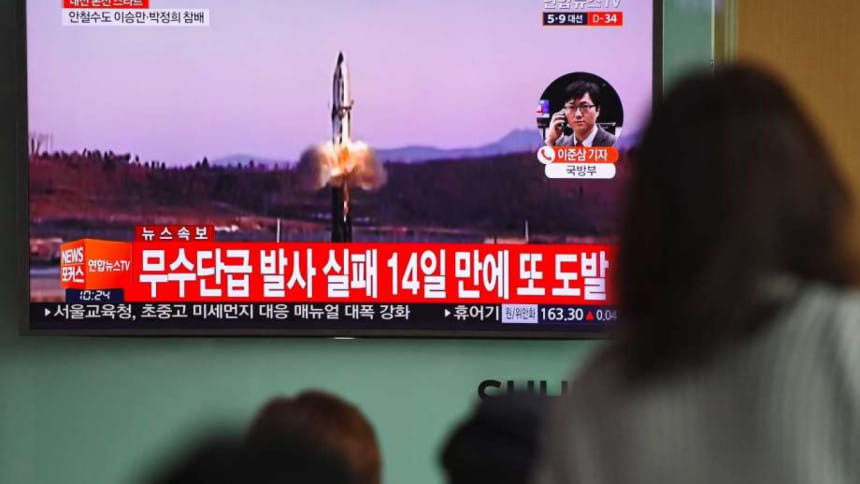End of 'strategic patience'?

`The policy under the Obama administration revolved around stricter sanctions against North Korea and wooing the Chinese to take a tougher stand against the Pyongyang leadership on the nuclear issue. President Trump, on the other hand, has stated, "If China is not going to solve North Korea, we will." But is it that simple? Yes, moving a US carrier strike group near North Korea in April 2017 and the joint exercises with South Korea and Japan make wonderful headlines, but the only country which has serious leverage on North Korea is China. Period.
Because China not only protects North Korea from a belligerent United Nations, it also happens to be its biggest trading partner. The close ties between the countries go back to the Korean War (1950-1953) in which China actively participated with boots-on-the-ground on the side of North Korea. In 2014, the bilateral trade between the two neighbours stood at nearly USD 7 billion, according to Seoul-based Korea Trade Investment Promotion Agency. As the leadership in Pyongyang grows increasingly erratic, especially with the assassination of Kim Jong-un's exiled brother in Malaysia, the Chinese leadership is beginning to worry. This is reflected in the temporary suspension of coal imports from that country in February 2017, which happens to be one of the few items that are exported legally. It is understandable why Beijing is not too keen on going along with the proposed UN sanctions that would cripple the economy and hence the Pyongyang leadership, which if pushed into a corner may react militarily.
No, the policy must be "carrot and stick" and not stick alone. Despite all the bluster coming out of Washington, it would be madness to give North Korea ultimatums. Those never work against hardliners, and the Kim sitting in Pyongyang is as hard as it gets. Given, that "China is currently North Korea's only economic backer of any importance", as stated by Nicholas Eberstadt, senior fellow at the American Enterprise Institute, any solution without Chinese participation is not a solution. When we look at the economic cooperation between the countries of late, we see that Beijing is in no mood to let Pyongyang go under because Washington proposes it. In 2015, the two neighbours opened a bulk cargo and container shipping route to boost North Korea's coal export to China. That is not all. The same year, the Guomenwan border trade zone was opened in Dandong (a city on the Korean border) to boost bilateral trade.
These are hardly any indications of Beijing going tough on Pyongyang. Dandong promises to be a crucial hub for bilateral trade, investment and tourism. Indeed, the food and energy aid China provides to its impoverished neighbour is of critical importance, especially with the Six Party Talks failing in 2009 (until then 75 percent of the aid came from the US, Japan, South Korea, China). While Washington sees the Pyongyang leadership at its weakest since the September 2016 floods that decimated crops, and with UN agencies stating that up to 15 million North Koreans (60 percent of the population) are now food insecure, China views the situation from a completely different angle. It does not savour the prospect of millions of refugees flooding over the border in case of a political meltdown in Pyongyang by any action a Western-led coalition could cause.
When one takes into account this perspective, one begins to understand why China has not been too keen to push North Korea. Yes, the Americans have provided South Korea with an anti-ballistic missile defence system (THAAD), but does the world really need another Cuban missile crisis on its hand? And we should have no doubts that North Korea will not fold like Libya or Iraq. During the Korean war, the north was bombed indiscriminately and in a country where the Kim(s) have been around for as long as they have - in isolation where the State has absolute control over every facet of life and which remains (ideologically at least) stuck very much in the Cold War era, every action by the West will be viewed with deep suspicion.
China for its part remains in a bind on the 1961 Sino-North Korean Treaty of Friendship, Cooperation, and Mutual Assistance, which makes it obligatory for Beijing to come to the assistance of Pyongyang in case the latter faced military aggression. A sore point to say the least, although one may wonder if push did come to shove whether China would live up to that clause. This is hardly lost upon the North Korean leadership and hence we are stuck in this endless cycle of nuclear tests and military brinkmanship on all sides. From Kim's point of view, the only thing standing between him and an-American led "invasion" is his nuclear arsenal. The only way out of this situation is of course for China and the United States to work out a deal with North Korea that would guarantee a non-aggression pact between North Korea and outside powers, in return for a dismantling of the nuclear programme. Washington for its part has to go the whole nine yards with a normalisation of relations, i.e. lifting of sanctions and aid to help rebuild the battered North Korean economy. Full diplomatic relations may be some way away, but a denuclearising process could pave the way for relations sometime in the future. The last time the world powers faced off was during the Cuban missile crisis in the early '60s. The situation is much more volatile this time around because the stakes are also much higher. We need cooler heads to prevail, and a peace deal can be worked out given all parties are sincere in their efforts.
The writer is Assistant Editor, The Daily Star.

 For all latest news, follow The Daily Star's Google News channel.
For all latest news, follow The Daily Star's Google News channel. 



Comments